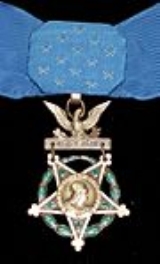
Ray E. Duke
Encyclopedia
Ray E. Duke was a soldier
in the United States Army
during the Korean War
. He posthumously received the Medal of Honor
for his actions on April 26, 1951.
Place and date: Near Mugok, Korea, April 26, 1951
Entered service at: Whitwell (Marion County), Tenn. Born: May 9, 1923, Whitwell, Tenn.
G.O. No.: 20, March 19, 1954
Citation:
Soldier
A soldier is a member of the land component of national armed forces; whereas a soldier hired for service in a foreign army would be termed a mercenary...
in the United States Army
United States Army
The United States Army is the main branch of the United States Armed Forces responsible for land-based military operations. It is the largest and oldest established branch of the U.S. military, and is one of seven U.S. uniformed services...
during the Korean War
Korean War
The Korean War was a conventional war between South Korea, supported by the United Nations, and North Korea, supported by the People's Republic of China , with military material aid from the Soviet Union...
. He posthumously received the Medal of Honor
Medal of Honor
The Medal of Honor is the highest military decoration awarded by the United States government. It is bestowed by the President, in the name of Congress, upon members of the United States Armed Forces who distinguish themselves through "conspicuous gallantry and intrepidity at the risk of his or her...
for his actions on April 26, 1951.
Medal of Honor citation
Rank and organization: Sergeant First Class, U.S. Army, Company C, 21st Infantry Regiment, 24th Infantry DivisionPlace and date: Near Mugok, Korea, April 26, 1951
Entered service at: Whitwell (Marion County), Tenn. Born: May 9, 1923, Whitwell, Tenn.
G.O. No.: 20, March 19, 1954
Citation:
Sfc. Duke, a member of Company C, distinguished himself by conspicuous gallantry and outstanding courage above and beyond the call of duty in action against the enemy. Upon learning that several of his men were isolated and heavily engaged in an area yielded by his platoon when ordered to withdraw, he led a small force in a daring assault which recovered the position and the beleaguered men. Another enemy attack in strength resulted in numerous casualties but Sfc. Duke, although wounded by mortar fragments, calmly moved along his platoon line to coordinate fields of fire and to urge his men to hold firm in the bitter encounter. Wounded a second time he received first aid and returned to his position. When the enemy again attacked shortly after dawn, despite his wounds, Sfc. Duke repeatedly braved withering fire to insure maximum defense of each position. Threatened with annihilation and with mounting casualties, the platoon was again ordered to withdraw when Sfc. Duke was wounded a third time in both legs and was unable to walk. Realizing that he was impeding the progress of 2 comrades who were carrying him from the hill, he urged them to leave him and seek safety. He was last seen pouring devastating fire into the ranks of the onrushing assailants. The consummate courage, superb leadership, and heroic actions of Sfc. Duke, displayed during intensive action against overwhelming odds, reflect the highest credit upon himself, the infantry, and the U.S. Army.
See also
- List of Medal of Honor recipients
- List of Korean War Medal of Honor recipients

